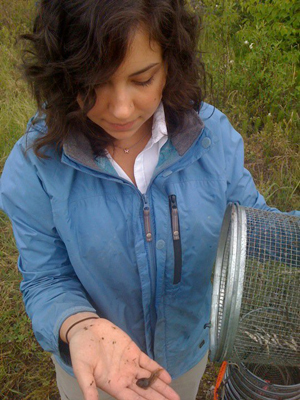Alicia Barlow , Fifth Year Masters
 Working in the stickleback lab has given me the opportunity to cultivate a wide range of laboratory skills while exploring and honing my specific interests in the field of biology. I started out with very little idea of what interests me, and have ended up fascinated by evolutionary ecology and the intricacies of life-history strategy.
Working in the stickleback lab has given me the opportunity to cultivate a wide range of laboratory skills while exploring and honing my specific interests in the field of biology. I started out with very little idea of what interests me, and have ended up fascinated by evolutionary ecology and the intricacies of life-history strategy.
I am currently in the process of writing my Master’s thesis, which focuses on investigating the response of threespine stickleback to changing temperatures during embryonic development. After graduation, I flew to Alaska where I spent three weeks in the field and in the lab conducting research for the stickleback lab. After helping with a few hundred crosses to fertilize clutches of eggs – some of which went towards my project – I flew home and spent the remainder of the summer raising embryos from five populations of stickleback across a range of six temperatures. Each clutch of eggs from a female was split equally across the six temperature treatments. I monitored embryonic development rate, hatching and feeding success, and total length of about 1,500 fry after feeding. I plan to have a manuscript ready to submit for publication in early 2011.
Aside from my research in the stickleback lab, I also lived in Baja, Mexico for three months in the spring of 2009 when I studied abroad through the School for Field Studies. I lived on the outskirts of Puerto San Carlos, studying sea turtles, gray whales, and blue crabs. My independent research focused on sea turtle mortality in the area, and involved walking along the beach and through miles of trash at the dump in search of discarded carapaces. It is illegal to poach turtles in Mexico, but turtle meat is still considered a delicacy and is often consumed during holidays when eating meat is not allowed. I studied coastal ecology, marine resource management, and the ethics and economics of sustainable development. It was also the first time I was introduced to the idea of environmental education and how it is lacking in many public schools. My time in Baja opened my eyes to the incredible amount of anthropogenically-facilitated environmental abuse that takes place every day all over the world. I also learned how important it is to educate people – particularly children – on the impact they have on their environment and give them the tools to start protecting and healing their world, rather than destroying it.
Outside the Lab:
I have played the violin since the age of six and performed as a member of Clark’s Sinfonia from 2008 – 2010. I have also worked in the Environmental Chemistry laboratory at Brown University since the summer of 2008, conducting water quality surveys on Naragansette Bay as well as performing a variety of other tasks, from biogenic silica extraction from bay cores to measuring elemental compositions in cores using a portable x-ray fluorescence unit.
Education
Current M.A., Biology, Clark University 2011
B.A., Biology, Clark University 2010
Awards
Clark University’s nominee for the Presidential Management Fellows Program, 2010
Clark University Traina Scholarship, 2006 – 2010